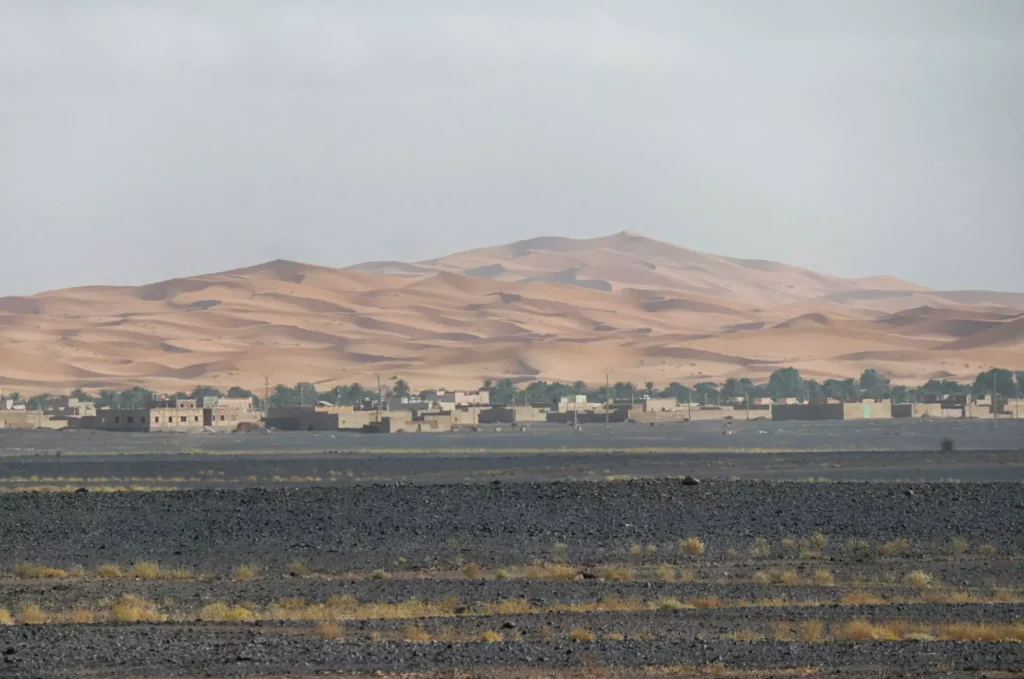
Introduction: Where Desert Meets Stone
The journey from Merzouga’s golden dunes to Todra Gorge’s soaring limestone cliffs is more than a road trip—it’s a pilgrimage through Morocco’s soul. This 3–4-hour traverse links the Sahara’s hypnotic emptiness to the High Atlas’ vertical drama, weaving through Berber villages, fossil-rich plains, and ancient irrigation marvels. Whether you’re a climber chasing adrenaline or a traveler craving raw beauty, this route delivers a symphony of contrasts. Let’s dive into the logistics, legends, and hidden gems that define this iconic Moroccan adventure.
1. The Route: Logistics & Transportation
By Private Transfer or Taxi
The most efficient way to travel is via private driver or taxi, cutting through the stark landscapes in 3–4 hours. From Merzouga, the N12 highway snakes westward toward Tinghir, gateway to Todra Gorge. For budget travelers, grand taxis (shared vans) are available, though they require a switch in Hassilabied—a hassle best avoided by pre-booking through your Merzouga hotel.
Pro Tip: Negotiate stops for photography and cultural detours. The road near Erfoud is dotted with fossil workshops, while the Ziz Valley’s palm oases offer shady picnic spots.
Self-Drive Adventures
Renting a 4×4 unlocks flexibility. The route is paved but includes winding mountain roads, especially near Todra Gorge’s entrance. Watch for potholes and sudden sand drifts in open desert stretches.
2. Key Stops: From Saharan Sands to Limestone Walls
Erfoud: Fossil Capital of Morocco
Just 1 hour west of Merzouga, Erfoud is a treasure trove of prehistoric relics. Local workshops polish ancient ammonites and trilobites into jewelry and tabletops. Stop at Fossiles d’Erfoud for a crash course in Paleozoic history—and don’t miss their “fossilized” bathroom sinks (yes, really).
Khettara Irrigation System: Desert Engineering
Near Rissani, the Khettara canals—a 1,000-year-old underground water network—sustain date palms and almond groves in the arid plains. Local guides offer tours of these hand-dug tunnels, revealing how Berber communities mastered desert survival.
Tinghir: Gateway to Todra
This bustling town is your final pit stop before the gorge. Wander the Palmeraie de Tinghir, a 14km palm forest fed by mountain springs, or haggle for silver at the Monday souk. For lunch, Café Atlas serves tagine with cliffside views of the Todra Valley.
3. Todra Gorge Unveiled: Climbing, Culture & Canyons
The Grand Arrival
As you approach Todra, the road narrows, flanked by 400-meter cliffs that glow amber at sunset. The gorge’s narrowest point—just 10 meters wide—feels like stepping into a geological cathedral. Park near Auberge Le Festival and stroll the riverside path, where Berber vendors sell mint tea and handwoven carpets (haggling required!).
Rock Climbing Mecca
Todra’s limestone walls lure climbers worldwide, with 400+ routes from beginner-friendly slabs to overhanging testpieces. Local outfitters like Aventures Verticales Maroc offer gear rentals and guided ascents of classics like Pilier du Couchant—a 9-pitch mixed climb with rusted pitons and jaw-dropping exposure.
Climber’s Tip: Morning shade on the Main Gorge walls makes for cooler sends. Post-climb, soothe calloused hands in the icy Todra River.
Nomadic Encounters
The Nomad Loop Hike (9km, 4 hours) winds past Berber tent settlements. Accept invitations for tea—it’s customary—but brace for carpet sales pitches. For a quieter alternative, explore Ksar Asfalou, an abandoned mud-brick fortress clinging to the cliffs.
4. Where to Stay: From Desert Camps to Cliffside Riads
Merzouga Desert Camps
Begin your journey under the stars at Luxury Sahara Sky Camp, where private tents feature en-suite bathrooms and rooftop terraces for dune gazing.
Todra Gorge Accommodation
- Riad Lalla: Family-run guesthouse with terraces overlooking the gorge. Hosts arrange guided hikes and traditional ftour meals during Ramadan.
- Auberge Tizgui: Budget-friendly cave rooms carved into the cliffs. Their rooftop mint tea sessions are legendary.
5. Local Flavors: Eating Your Way Through the Route
- Camel Milk: Stop at Desert Farms near Rissani for a frothy glass—nutrient-rich but pricier than champagne ($10/glass).
- Berber Pizza: At Café des Gorges, try medfouna—a stuffed flatbread baked in desert sand.
- Date Honey: Tinghir’s markets sell jars of sticky-sweet dibs, perfect for drizzling over goat cheese.
6. When to Go: Seasons & Survival Tips
- Spring (March–May): Ideal for climbing and hiking (20–25°C). The Palmeraie blooms with apricot trees.
- Summer: Scorching days (35°C+), but dawn climbs are manageable. Pack electrolyte tablets.
- Winter: Chilly nights (near freezing) reward with solitude. Ice forms on higher routes—bring crampons.
Conclusion: The Call of Contrasts
Merzouga to Todra Gorge isn’t just a transfer—it’s a metamorphosis. It’s trading camel tracks for crimp lines, swapping dunes for dizzying walls, and trading desert silence for the echo of Berber drum circles. As one climber quipped after summiting Todra’s Chouca Nord: “The Sahara melts your soul; these cliffs rebuild it.”
Ready to Traverse?
Pack light, haggle hard, and let the Atlas Mountains rewrite your definition of adventure. For deeper dives into Todra’s climbing routes or Berber culture, explore curated guides at TodraGorge.com’s blog—your digital compass for Morocco’s vertical wilderness.
References: Insights synthesized from traveler testimonials, logistical guides, and cultural deep dives.